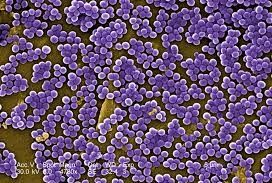Wastewater to Fight Against Antibiotic-resistant Microorganisms
Published on by Water Network Research, Official research team of The Water Network in Technology
Municipal wastewater may become a key ally in the fight against antibiotic-resistant disease-causing bacteria and fungi, a new study at Stellenbosch University (SU) found.
"Certain bacteria in municipal wastewater produce antimicrobial compounds or biosurfactants that can help prevent the growth of antibiotic-resistant microorganisms which cause serious infections in humans," says Dr. Thando Ndlovu a postdoctoral researcher in the Department of Microbiology at SU. Ndlovu recently obtained his doctorate in Microbiology at SU under the supervision of Prof Wesaal Khan from the same department.
He says the rapid increase in the emergence of antibiotic-resistant bacteria was a major reason behind his search for new antimicrobial compounds.
As part of his research, Ndlovu collected wastewater samples and also carried out molecular and microbiological tests in a laboratory on various biosurfactants-producing bacteria found in these samples. He isolated two bacterial strains whose biosurfactants proved effective against antibiotic-resistant disease-causing bacteria.
Biosurfactants are compounds produced naturally by bacteria, fungi or yeasts and they have been commercially utilized in shampoos, shower gels, and household cleaning products. They are also used in food, agriculture, cosmetic and medical industries as well as in environmental bioremediation to prevent the spread of spoilage and disease-causing bacteria.
"The biosurfactants produced by the two bacteria in my study prevented the growth of major disease-causing bacteria such as methicillin-resistant Staphylococcus aureus and gentamicin-resistant E. col i which can lead to life-threatening infections in humans," says Ndlovu.

Image: Staphylococcus aureus
"This finding is promising given worldwide reports on the number of deaths caused by antimicrobial resistant microorganisms that are becoming increasingly difficult to treat with current drugs."
"The discovery of novel antimicrobial compounds is a priority and biosurfactant compounds could be used to develop new antibiotics for treatment of various infections caused by antibiotic resistant bacteria and eventually replace ineffective antibiotics in future."
Ndlovu says his study showed that municipal wastewater is ideal for the isolation of diverse biosurfactant-producing bacteria that could be utilized in the production of such compounds for commercial use.
"While numerous studies have reported on the isolation of biosurfactant-producing bacteria from contaminated soil and terrestrial environments, the current study indicated that municipal wastewater could be exploited for the isolation of diverse biosurfactant-producing bacterial strains."
"Biosurfactant-producing bacteria thrive in polluted environments such as contaminated soil or water. These bacteria also have the ability to outcompete other bacteria in the same environment because the biosurfactant compounds help them to absorb nutrients and to protect them from toxic materials."
Ndlovu adds that biosurfactant compounds can be used to reduce the use of synthetic antimicrobial agents for various purposes such as cleaning and coating agents to prevent the build-up of disease-causing and spoilage bacteria.
As far as future research is concerned, Ndlovu says he is now focusing on the application of biosurfactant compounds with antimicrobial properties.
Source: News Medical
Media
Taxonomy
- Public Health
- Microorganism
- Bacteria
- Antimicrobial
- Wastewater Treatment
- Public Health
5 Comments
-
Thank You Guy
-
Well Stated Jean. The overall reading suggested a pharmaceutical wanting another product that will not cure just become a maintenance drug for repeat purchase. The reduced efficacy is quite intentional. The use of antibiotics automatically requires you to reestablish your own immune system.
-
Hello
Wastewater contains neither more nor less all the microorganisms that are found on our planet. Man is invaded, nature also and it is a good because it is thanks to them that we are still alive.
It is therefore a false cliché to believe that wastewater produces or manufactures micro organisms out of norms. Those that resist the environment in total biological dysfunction of the wastewater medium have passed through by pure chance.
Then, on the one hand, it is certain that these microorganisms end up becoming accustomed, on the other hand that these antibiotics or other antiseptic products no longer have the same efficacy as in their origin of production for a question of cost.
-
Bonjour
La NATURE créé le Vivant et tout le Vivant a un rôle déterminé à jouer dans l'environnement.
Il n'existe pas de bactérie pathogène, toutes les bactéries sont UTILES. Sans elles nous serions déjà tous morts. Toutes les bactéries que nous trouvons dans les eaux usées sont les mêmes qui envahissent notre corps et le recouvrent. Toutes les bactéries sont inoffensives dès lors que l'équilibre de notre éco système est en harmonie. Sortie de ce contexte la bactérie a un rôle à jouer: la sélection naturelle.
En voulant détruire certaines bactéries ( incompréhensible qu'elles soient devenues l'ennemi de l'homme) l'homme va déséquilibrer cette harmonie et faire des ravages.
C'est un suicide.
Hello the NATURE created living things and all the living has a determined role in the environment.
There is no pathogenic bacterium, all bacteria are useful. Without them we would all be dead. All the bacteria that we find in the wastewater are the same who invade our body and cover it.
All bacteria are harmless as the balance of our eco system is in harmony. Out of this context the bacterium has a role to play: natural selection.
Wanting to destroy some bacteria (incomprehensible that they have become the enemy of man) the man will unbalance this harmony and wreak havoc.
It's a suicide.
-
Great work Dr Ndlovu. Your work will be very important to third world countries that do not have access to modern microbiology. To reinforce your findings try looking into Dr Oppenheimers work on the Archaea. These RNA microbes have the genetic code for reducing all organic compounds into their elemental/nutritional form. They also chelate any and all toxic metals. Doing monthly tests for 40 years not one pathogen has survived in the Archaea matrix. Great for waste treatment facilities, septic tanks, oil and chemical spills, cleans soil of pesticides and chemical fertilizers. Also the worlds leading probiotic. This world is really a mess. All fields of study are needed. Congrats.